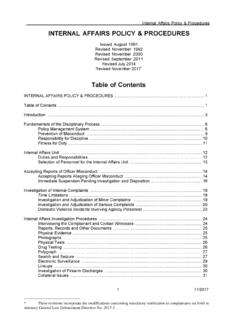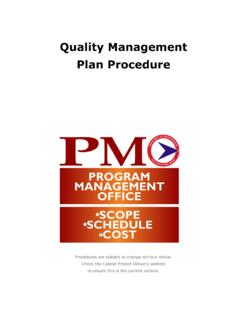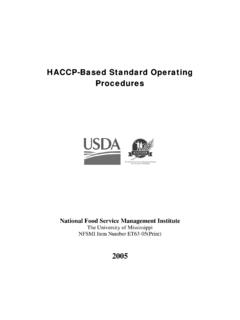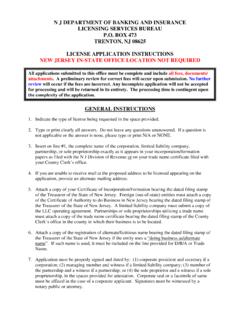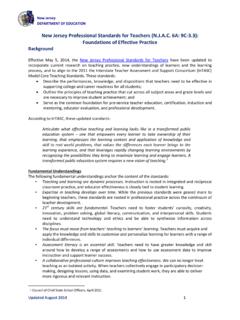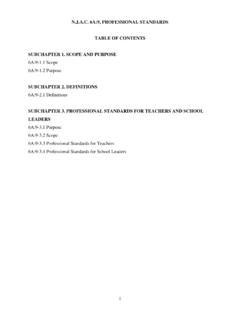Transcription of Education Transformation Task Force Final Report
1 1 Education Transformation Task Force Final Report September 5, 2012 2 Contents Introduction .. 3 Accountability Systems .. 12 Liberating Educators from Restrictive Statutory Mandates .. 16 Overview .. 16 Talent .. 17 Performance (including accountability, governance and fiscal efficiency) .. 22 Innovation .. 36 Academic (including student health and safety) .. 38 Liberating Educators from Restrictive Regulatory Mandates .. 42 Overview .. 42 Academic .. 44 Talent .. 104 Performance .. 128 Innovation .. 160 Next Steps .. 169 Appendix .. 170 Additional Regulatory Reform Recommendations .. 170 Academic .. 170 Talent .. 193 Performance .. 195 Innovation .. 229 Task Force Membership .. 238 Acknowledgements .. 239 3 Introduction The core goal of New Jersey s Education system is to ensure that all children, regardless of background or economic circumstances, graduate from high school ready for success in life. New Jersey s performance, while strong compared to most other states, falls far short of that standard.
2 The achievement gap between economically disadvantaged students and their wealthier peers remains staggering a sharp and disappointing reality that flies in the face of one of our most fundamental national ideals: equality of opportunity. The dramatically changed economic environment of the 21st century characterized by increased global competitiveness and a shift from an industrial- to a knowledge-based economy has shed a harsh light on another achievement gap. There is a growing chasm between what we require children to learn to be eligible to graduate from high school and what they actually need to learn to be truly ready for college and career. While New Jersey boasts one of the nation s highest graduation rates, we should also be deeply concerned that a high percentage of our graduates require significant additional remediation before being able to pursue higher Education .
3 The aspiration to graduate all students ready for success in college and career is rooted in practical realities. According to the Bureau of Labor Statistics, between 1998 and 2008, the economy lost 600,000 jobs previously available to people whose highest degree was a high school diploma. During the same period, more than 10 million jobs became available to people who had obtained a college or technical degree. From the outset of his administration, Governor Christie has called for a critical and unflinching examination of all that is, and is not, working in the State s Education system. In celebrating New Jersey s many successes, the Governor has repeatedly credited the State s educators for their extraordinary contributions and selfless dedication. At the same time, he has insisted on an honest and forthright assessment of areas where we can serve our students better. Toward that end, the Governor on April 4, 2011, issued Executive Order 58 establishing an Education Transformation Task Force , consisting of accomplished educators from across the State.
4 58 charged the Task Force with two interrelated responsibilities: 1) Review existing accountability systems including the Quality Single Accountability Continuum (QSAC) and provide recommendations on a revamped accountability system, which would grant more autonomy to public schools and public school districts while maintaining strict measures of accountability in the areas of student performance, safety and fiscal responsibility. 2) Conduct a comprehensive review of all Education -related statutes and regulations to determine the extent to which they increase the quality of instruction for students, improve academic achievement of students, improve teaching effectiveness within schools or improve the safety and well being of students .. or are overly prescriptive. 4 To date, members of the Task Force have met 14 times, held four public hearings, conducted four focus groups that engaged more than 40 educators, hosted meetings with numerous stakeholder organizations and heard presentations from at least a dozen expert witnesses.
5 The Task Force also benefited from the participation of three members of the State Board of Education . The Task Force produced an Initial Report , which Governor Christie released to the public on September 12, 2011. Pursuant to the further direction of Executive Order 58, the Task Force respectfully submits this Final Report . The work of the Task Force takes place in the context of perhaps the most ambitious set of organizational and directional changes in the history of the New Jersey Department of Education (Department). During the last 12 months, the Department has defined its mission and its measure of success in clear and unambiguous terms. All of the Department s activities are organized around meeting the goal of preparing all students for success in college and career, regardless of their life circumstances. Though easily said, the implications of this mission are profound. It means that the Department is committed to helping New Jersey s many successful schools elevate their work to even higher levels.
6 Though we should rejoice when most of a school s seniors proudly walk across a stage in the spring, we must strive to have all students graduate. We also must have confidence that their diplomas signal that they are fully prepared to excel in higher Education and the workplace. Even more important, however, are the implications for our most persistently underperforming schools and the students assigned to them. Believing in the potential of every single child requires a massive shift in our collective understanding of the purpose and promise of public Education . It means proclaiming proudly that our public schools exist to provide every single child, regardless of circumstances exogenous to school, with the knowledge and skills needed to succeed throughout life. We must concede that the world deals tragically bad hands to many children burdening them with poverty, challenging home and community environments, and more and that overcoming those challenges is extraordinarily difficult.
7 At the same time, progress depends on our belief that talented educators and effective schools can make a profoundly significant difference in helping children achieve despite the challenges imposed by circumstances beyond their control. When large, predictable swaths of our young people low-income boys and girls, African Americans, Hispanics and others consistently fall behind, we must honestly acknowledge that our public schools are not delivering on their promise and purpose. Poverty and other forces matter, but so do our schools. Good schools help students transcend the challenges they face, while mediocre ones are unequal to the task. Yes, there are enormous challenges associated with enabling every child to succeed. But that doesn t take away the responsibility of adults in our public Education system to organize their efforts, deploy their resources, and shape their craft to advance student learning to consistently higher levels.
8 5 For decades, many of the State s Education leaders have shown an extraordinary commitment to New Jersey s children, working to change policies and practices to drastically improve achievement. But a clear-eyed accounting of our standing forces us to admit that the current order has not produced the results we so desperately need. Results from the New Jersey Assessment of and Skills and Knowledge (NJ ASK) reveals that 40 percent of third graders in New Jersey are not reading at grade level. According to the National Assessment of Educational Progress (NAEP), only a handful of states have a larger achievement gap between economically disadvantaged students and their wealthier peers. Nearly 90 percent of students entering some of our community colleges require remediation in reading, writing or math. It is for these reasons that the Task Force applauds this administration for applying a very different approach to the work of the Department: If we are to generate substantially different outcomes, we must apply substantially different strategies.
9 We believe that a new operating philosophy can maximize the State s impact in particular areas, better position all of our schools to succeed and ultimately lead to drastically improved student achievement. At the heart of this new approach is a fundamentally different relationship between the State and its districts, schools, and educators. First, the State should set the highest expectations and take the necessary steps to codify them so all districts and schools are aiming at the same very high targets -- targets that are sequenced from preschool through high school to enable a child to progress sequentially and deliberately toward college and career readiness. Second, the State should empower educators to do what s best for students; this means freeing them from unnecessary burdens and providing them with the supports they need to innovate and succeed. Third, the State should hold districts and schools accountable for outcomes.
10 School and district success should result in a light touch from Trenton; failure should lead to differentiated and meaningful interventions. It is certainly the case that every new administration talks about bringing a new approach to the work of Education . This is standard fare in the world of politics and policy. But during the last year, the Department has taken numerous steps to align its work with this new philosophy. New Jersey embraced the Common Core State Standards (CCSS), rigorous academic standards detailing what students should know and be able to do in key subjects as they progress through K 12 schooling. The State is also serving as a governing board member of the Partnership for Assessment of Readiness for College and Careers (PARCC), the multi-state collaboration to develop challenging assessments aligned with the CCSS. 6 To ensure that the highest expectations touch all of our schools and inform all of the State s work, the Commissioner1 appointed a College and Career Readiness Task Force .

